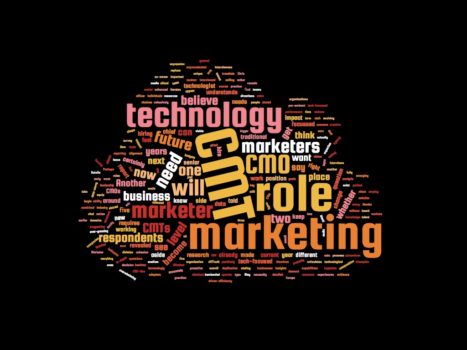The Evolution of the CMO
by Sonja Kroll on 5th Jan 2016 in News

Marketing and technology complement rather than contradict each other, at least when it comes to the role of the CMO. In this piece, Chris Le May (pictured below), SVP & MD, Europe and emerging markets, DataXu, takes a look at the changing importance and impact of the role of the CMO.
The ever-growing impact of technology on the role of the marketer has sparked a debate around whether a chief marketing officer is now morphing into a chief marketing technologist. Is the CMO evolving from the guardian of creative expression into the champion of data-driven efficiency? There is evidence for and against this, as revealed in our report ‘The New Marketer’, released in 2015. An overwhelming 70% feel that, over the next five years, more companies will begin hiring CMTs and tech-focused marketers in general. 53% say most organisations should employ both a CMO and a CMT, or tech-focussed senior marketer. 35% believe CMTs are so vital to the future of business that they will replace the traditional CMO role.
 A question around the current composition of marketing teams revealed that 14% of our respondents appear to be early adopters and already have a CMT in place. A further 8% stated that they already operate in a CMT-like role. Our research (a survey of 250 UK marketing decision makers, combined with 10 in-depth interviews) reveals detailed experiences . One of our interviewees, co-owner of a media agency, told us the CMT role is “an absolute necessity”, adding that “if you are being bombarded by technology, you need someone in place who fully understands how each type of technology works. The CMTs are the ones forcing agencies to re-evaluate their technology offering, so they aren’t being ripped off”.
A question around the current composition of marketing teams revealed that 14% of our respondents appear to be early adopters and already have a CMT in place. A further 8% stated that they already operate in a CMT-like role. Our research (a survey of 250 UK marketing decision makers, combined with 10 in-depth interviews) reveals detailed experiences . One of our interviewees, co-owner of a media agency, told us the CMT role is “an absolute necessity”, adding that “if you are being bombarded by technology, you need someone in place who fully understands how each type of technology works. The CMTs are the ones forcing agencies to re-evaluate their technology offering, so they aren’t being ripped off”.
Another marketer said: “I think [the CMT role] is a current need, definitely. The speed of change requires us to have somebody fulfilling that role now. The pace of change is incredibly scary and that person needs to keep up-to-date and keep their finger on the pulse. You need a CMT there who understands technology, maximising the return for your investment then and there.”
Marketers not only see the importance of the CMT role, but 31% are invested enough in it to say that they hope to become a CMT in the future. Yet, not all marketers are united in their views. 37% of respondents believe that the traditional marketing role will become redundant in favour of a more technologically focussed role, while 39% disagree with this. There are also those who are not convinced about the validity of the CMT role. Just over a quarter (26%) of marketers believe that the hiring of CMTs and tech-focused marketers will not be a continuing trend.
41% of our respondents say there is no need to hire a CMT or create a new position to deal with marketing technology. As one of our respondents told us: “We have an IT Director and, regarding marketing, we take his advice on anything we want to look at from a technology point of view. I can’t see us employing a dedicated marketing technologist. I see the colleague we have in IT rising in the ranks.”
Another marketer agrees: “The interrelationship between marketing and technology, marketing and HR, marketing and finance are getting more complex and closer, so if you have a CMT you’d need a CMF or a CMHR. Where do you draw the line?”
Potential duplication aside, three of the marketers interviewed feel that the CMT role is only viable in a bigger organisation, with the budgets, resources and scale to support the role. Some 53% believe CMOs and CMT should be working in tandem, as one marketer articulates: “I think that you have to have both sets of knowledge; you can’t really have one without the other.”
Another of our marketers theorises that CMOs and CTOs would affect a business positively both in structure and future performance, but questions how this would work in practice: “It would be very difficult for the two roles to exist side by side. I think that the CMT role would probably report to a CMO. It would be a very senior marketing position, but I don’t know if it would actually get to that level, certainly in the medium term. I guess my question would be whether I’d want to go in two different directions with two different people. You’d want them to be working cohesively.”
For the role to work, cohesion is, of course, key. As another marketer iterates: “You’d have to get the shared vision so right, and you’d have to get the alignment of goals. It’s whether or not it’s at that CMT level, or is it the next level down but still reporting to the CMO? That’s the issue.”
Logistics aside, 49% agree that both a CMO and CMT should sit at board level, suggesting that marketing and technology should not just be siloed domains, but have an increasingly important impact on a business overall
While the CMT role may not be the perfect solution for every business right now, our research indicates that it will certainly become a preeminent one in the next five years, thanks to the unprecedented demand for a new data-savvy marketer.
This is a conundrum that technology alone can’t solve, but rather needs a mix of tools and talent to shape the future of marketing. The ability to accurately translate data into insights and action requires input from individuals with a unique blend of industry expertise and analytic prowess – this is where the CMT will find their calling, and earn their place in the leadership team.
Whether you hire a CMT or fortify the CMO role and marketing division with enhanced technological capabilities – we would not hesitate in stating that one of these two choices must be made. Perhaps in five years’ time we’ll know the answers for sure; but by then it will be too late – proactive moves need to be made now to equip businesses for a tech-focussed future.








Follow ExchangeWire